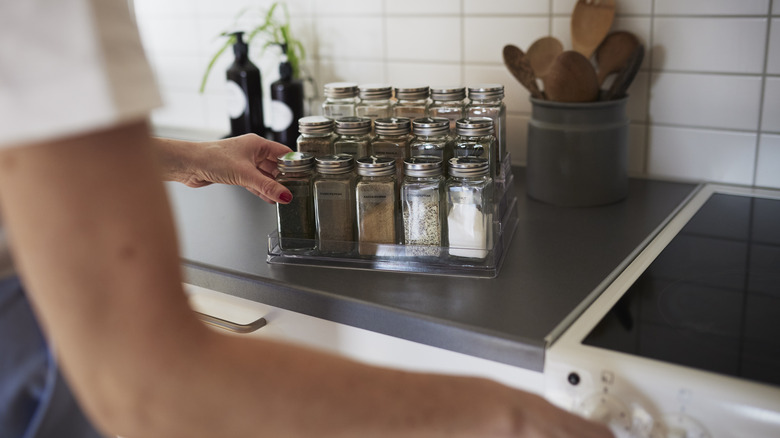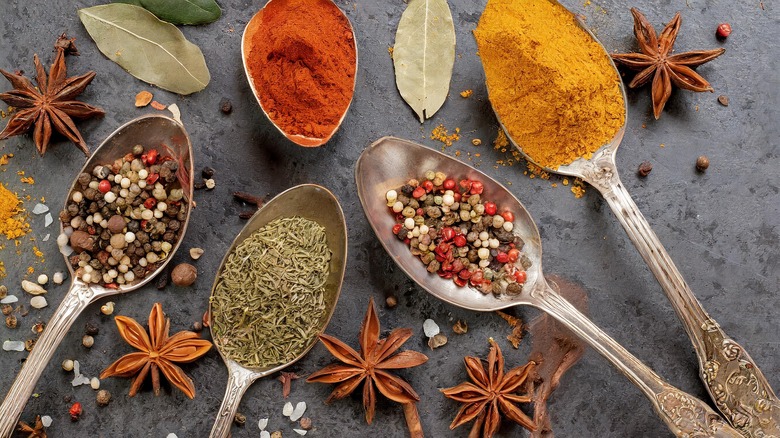Here's How Often You Actually Need To Replace Spices
From spicy peppercorns to vibrant jars of paprika, there are thousands of flavorful spices you can use to fill up the spaces on your kitchen shelves. While each comes with its own set of stipulations, there are some general guidelines you can learn to keep track of the freshness levels of all spices. For example, knowing that ground spices lose their quality faster than whole is important to note. And neither one is particularly better than the other either. Ground spices might be more convenient, but whole spices retain their flavor better.
This is why you should buy ground spices in smaller quantities, as they might remain fresh for just two to three years instead of three to four, like most whole spices. Those bulk buys might seem more affordable, but be realistic about how much spice you'll really use. Still, for the absolute best quality, you should really be using your spices within a couple of months.
For more exact information on how long your spices will remain good for, it's a smart idea to purchase spices that share important information, such as harvest dates, on the bottle so you can calculate exactly how long the spice will stay fresh for. Here's a few quick mentions. Salt and vanilla extract typically last longer than other spices, almost indefinitely, unground seeds and spices should last about three to four years, while powders such as ground cumin or chili powder will last closer to two or three.
Storing spices for optimal freshness
To store spices for the longest lasting flavor, you should always keep your seasonings at room temperature in airtight containers. Make sure the jars are the right fit for your spices too, because excess space in a container means more air exposure, which will make your spices reduce in quality faster. You should also utilize a darker space to store your spice rack, where light will not accelerate the deterioration of the spice's quality. (Which is why it's a good idea to chose darker storage vessels for spices too.) Not only can light bleach out a seasoning's colorful hues, but it can also make pungent spices lose their heat, as the sun interferes with the chemical structures of those powders.
Lastly, it would also be a good idea to mark the expiration date somewhere on your spice's bottle. Even if it is already printed on the packaging, these sensitive labels are prone to rub off over time. So, to avoid any guesswork, mark the date of your spices with a label of your own.
How to know when spices are past their prime
If your spices are looking dull, or you find you need to use much more than a recipe calls for to garner any flavor, it's probably time to buy new seasonings. And you can also give seasonings a sniff to save yourself from a major flavor disappointment.
If a spice is past its prime, and you've been using it for a while, don't panic. Unlike spoiled milk or meats, most spices don't go bad in the sense that they're harmful past a certain date. They just don't taste as strong after a period of time, but will still be safe to consume. Luckily, there is a simple way to revive older spices. If it's only a few months past its prime, you can add some powdered spices to a dry pan to revive its flavors. Simply stir over medium heat until fragrant to realize the hidden taste and aromatics, then take off the heat to cool. Now stick the spice back in the jar for later use.
Still, the absolute best of foods are made from fresh, quality ingredients, so if you're suspicious of that jar of red pepper flakes that has been sitting in the back of your pantry, it might just be better to buy a new jar. Switching to fresh seasonings will change the flavor of your food, so your tastebuds will thank you for the upgrade.


